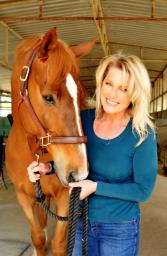Acupuncture benefits all horses from young to the aged and is an added resource for improving the health and performance of sports horses. It provides a drug free alternative and is an added tool to resolve challenging issues. Advanced dental techniques are offered for all horses which improves their ability to eat, decreases feed costs, preserves their teeth longer and improves comfort and performance for horses when bridled.
We offer top of the line technology, diagnostics and treatment. This includes the newest in digital ultrasonography, digital radiography, focused and radial shockwave therapy, regenerative medicine and complementary therapies.
We are a full-service Equine Veterinary Mobile Practice in North San Diego County with 24 hour emergency service. General Medical care along with preventative medicine are the foundation for good health for all animals. In addition, emphasis on Sports Medicine for the equine athlete keeps them sound and working through all events. Dr Grim is one of the few veterinarians in the area offering advanced equine dentistry in San Diego and she has added integrative medicine through her study of acupuncture, herbs and other complementary modalities.
We value your opinion, please have fun while taking our:
"After 30 years in practice, growth and change and new information is always exciting. As we delve into advances in sports medicine, advanced dentistry and acupuncture our mission is to offer cutting edge medicine coupled with care and concern to keep your horse healthy, happy and sound!"
Integrative Equine Veterinary Medicine for Complete Wellness and Optimal performance
SM
Sorry, we're unable to load this blog.
TEXTING POLICY:
To opt in for texting you may start by initiating a text to our Phone number: 760-634-2144. We will not sell or share you information ever. We do not send out sales texts. Texting is provided only as a convenience to a client who may want to provide more information to the Doctor such as pictures. Texts will only be accepted M-F 8am-5pm. For other needs or emergencies. Call 760-634-2144.
You can opt out of texting any time by Replying "Stop" in the text app.
SMS privacy policy
SMS Terms and Conditions: Information obtained as part of the SMS Consent process will not be shared with third parties
Types of SMS Communication: This is solely for the convenience of the client to provide the doctor with more information about their pet. Equitage Horsecare will only use SMS communication to respond to a clients requests or to let them know the doctor is running late.
Standard SMS Messaging Disclosures: Message and data rates may apply, You can opt-out at any time by texting STOP. For assistance Text HELP or call our office 760-634-2144

